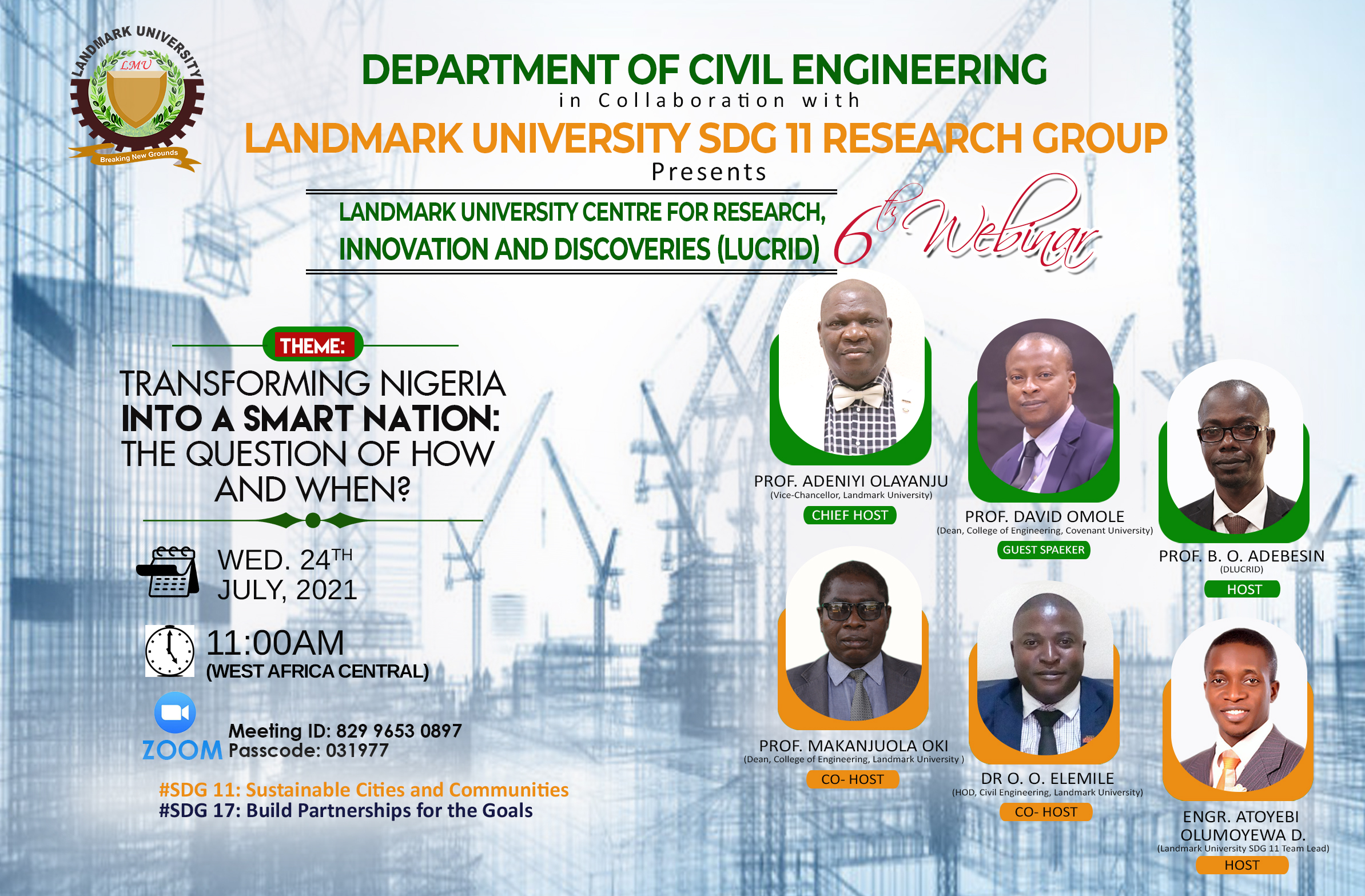6th Webinar Series
6TH LUCRID WEBINAR HARPS ON TRANSFORMING NIGERIA TO A SMART NATION

On Wednesday 14th July 2021, Scholars from various platforms converged on the 6th Landmark University Center for Research, Innovation and Development (LUCRID) webinar organized by SDG 11 Research Group under the auspices of the Department of Civil Engineering to address the theme “Transforming Nigeria to a Smart Nation: the Question of How and When”.
The Guest Speaker, Dean, College of Engineering Covenant University, Engr. Professor David Omole, in his presentation noted that a working smart community must consist of a holistic and interdependent, working components such as the people, infrastructure, institutions, and operations while smart cities are intelligent, responsive, connected and sustainable. Professor Omole added that smart cities are essential for efficient allocation and use of resources, efficient management of populations, smooth operations and improved quality of life and life expectancy.
According to him, availability of data, energy, telecommunications, transportation, water, finance, policy, regulations and institutions, politics and political will, health and safety, urban planning, Technology and innovation as well as academic input amongst others are some of the attributes of smart cities. While he listed population risk factors, failure to stick to the master plan by Federal Government, over reliance on foreign loans, corruption and entitlement mentality by citizens as some of the current challenges of Nigeria, Professor Omole stated that aggressive doggedness and commitment must be enforced for Nigeria to move out of its current state of infrastructural deficit. “No country moves forward without massive investment in infrastructure”, Professor Omole asserted.
Quoting Habakkuk 2:2, Professor Omole admonished the government to have a clear vision of the smart city project to run with it as summarized into Documentation, Transparency, Media, Implement and Reference. Other ways out of the huge infrastructural deficit the speaker identified include exploring public-private partnership, curbing wastage and corruption, citizens responsibility and imbibing good maintenance culture among others.
Earlier in his remarks, the Vice-Chancellor, Professor Adeniyi Olayanju stated that a truly smart city needs multiple layers of intelligence, smart and transparent governance which devolves power to the city, a smart economy which promotes job creation and formalizes the informal, smart environmental management through the creation of intelligent infrastructure and a circular use of resources and smart planning which creates dense, walkable and inclusive urban spaces.
Professor Olayanju added that innovative and emerging technologies are increasingly being used to create new services and improve solutions in the public and private sectors. According to the Vice-Chancellor, when a society functions efficiently, lots of new opportunities that add significant value and tremendous economic growth are brought into existence. Smart nations are truly independent and globally competitive with the strong ability to speedily and effectively grow talent, generate new ideas, attract investment and drive growth are also characteristics of smart cities the nation should work on.
Professor Olayanju later appreciated the Guest Speaker Professor David Omole for the simplicity of his delivery on smart cities, the Vice-Chancellor added that Landmark already aligns with her goals tagged “12 Landmark Sustainable Goals”, which according to him would be holistically incorporated into the University’s activities for optimum results.
Participants from different institutions in Nigeria, United Kingdom and Japan both online and on site expressed hope that in no distant time, the nation would rise up to proffering solution to the daunting challenges thereby making things right.
